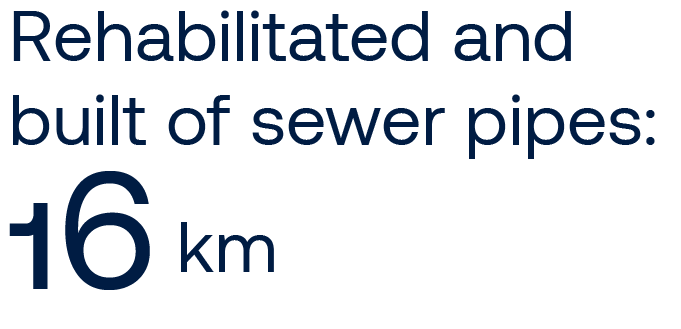Sustainability statement
Tallinna Vesi carried out an initial assessment of key sustainability issues in 2023, which was updated in 2024. The assessment was based on the principle of double materiality, i.e. both the impact materiality and the financial materiality of sustainability topics were considered. The assessment was carried out across the value chain, taking into account all business lines of the group.
Climate change
In order to reduce its climate impact, Tallinna Vesi has prepared a transition plan called Climate Impact Reduction Plan, in which we have set ourselves ambitious targets to reduce our carbon footprint and reduce energy consumption. Our Climate Impact Reduction Plan is as much about climate change adaptation as it is about climate change mitigation. The Climate Impact Reduction Plan can be found on the company’s website in the Corporate Social Responsibility > Carbon Footprint section and describes the company's climate goals and targets, the principles for calculating the carbon footprint, the key assumptions and the actions and performance required to achieve these targets.
Pollution
In preventing and reducing pollution, we have been guided by the limits set in the environmental permits we hold. This means that we have made targeted efforts to prevent and reduce pollution within the scope of these environmental permits. We consider it of the utmost importance that all our emissions to air and water are in line with the conditions set out in the environmental permits issued to us.
Water and marine resources
Approximately 90% of our consumers in Tallinn and the town of Maardu get their drinking water from surface water. Although Lake Ülemiste is the main source of drinking water for the people of Tallinn, the natural catchment area of the lake itself is small. In order to increase the volume of water and meet the needs of the city of Tallinn, a water catchment system has been established, consisting of hydraulic units built on rivers and the reservoirs and canals connecting them.

Own workforce
Maintaining the overall wellbeing of our employees is very important to us, which is why we promote a safe and fair working environment and actively support succession planning. To promote employee satisfaction, we carry out employee surveys to find out what is going well in the company and what areas need more attention. Feedback from employees helps us make decisions, and helps employees understand the reasons behind decisions and the need for change.
Workers in the value chain
We work with our partners to ensure compliance with health and safety requirements, as required by law and established by the company, at all construction and repair sites. We conduct regular internal safety inspections at all sites to ensure compliance and the safety of our partners' employees.
Affected communities
We support our community and actively participate in community activities that are directly or indirectly related to our business. We believe it is important to raise environmental awareness and emphasize the role of tap water as a clean, environmentally sustainable and affordable source of drinking water.
Consumers and end-users
We provide water and wastewater services to approximately 25,000 contractual customers and about 500,000 end-consumers in Tallinn and its surroundings. Hence, we are responsible for ensuring that more than a third of Estonia’s population has access to reliable, high-quality water and wastewater services.
We enable sustainable urban development by delivering high-quality water services, pioneering modern stormwater solutions and developing green urban space. We connect our customers to the vital water infrastructure and deliver excellent customer experiences using smart solutions and digital service channels.
We keep prices affordable for our customers by continuously improving our efficiency through modern technologies, digitalization and automation.
Business conduct
In matters relating to business conduct, the Management Board of the company has approved the Code of Conduct by its resolution dated 17/05/2017. These are guidelines, undertaken voluntarily, some of which are also covered by national legislation, the UN Guiding Principles on Business and Human Rights, the UN Convention Against Corruption and the OECD Due Diligence Guidance for Responsible Business Conduct. At the end of 2024, the requirements of the Code of Conduct were slightly updated, including merging it with the previously separate whistleblowing procedures. The new guiding principles on business ethics take effect from 01/01/2025 and are available to all on the company's website under the Business ethics section.


















